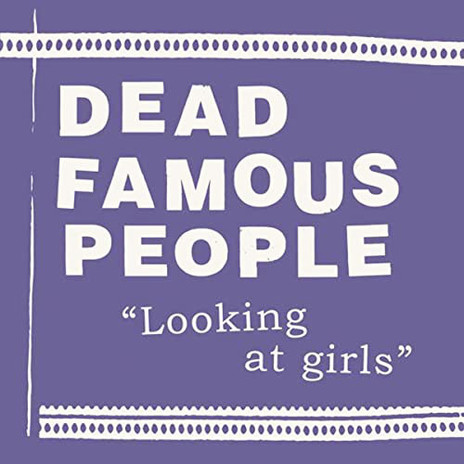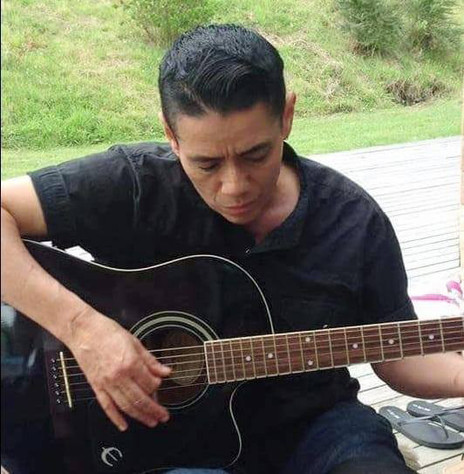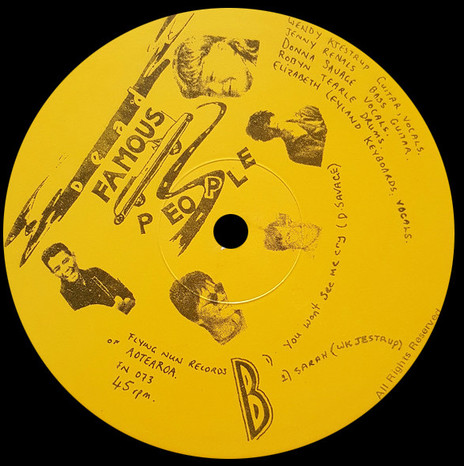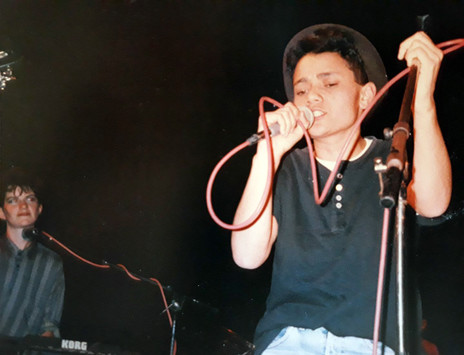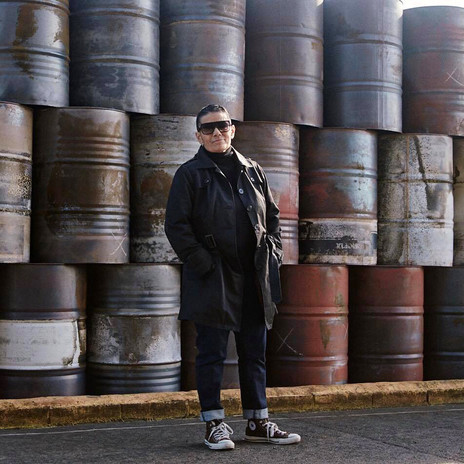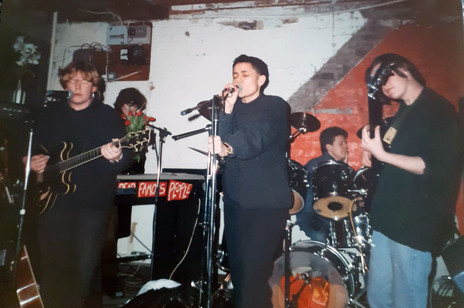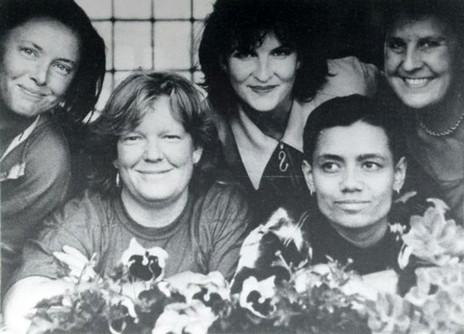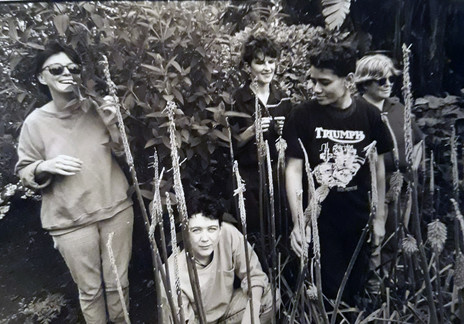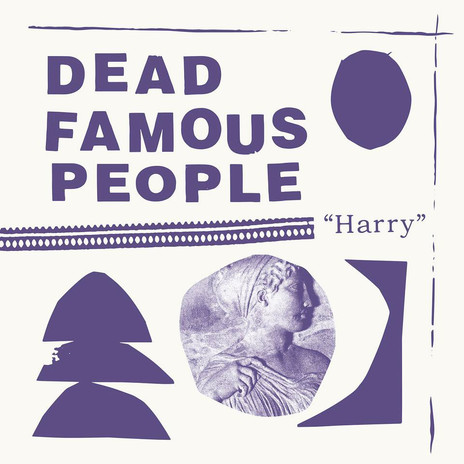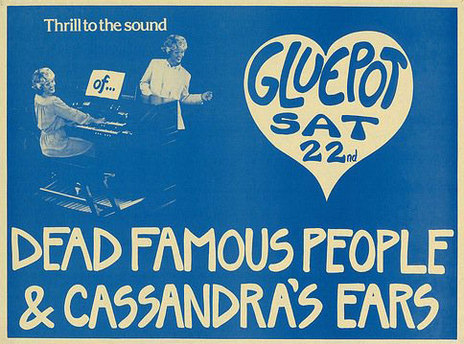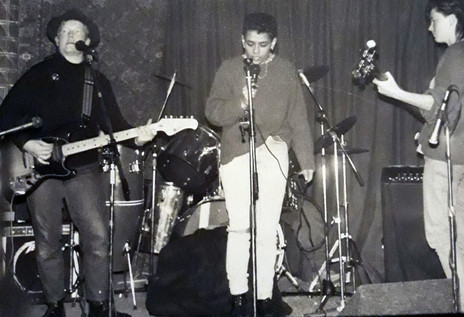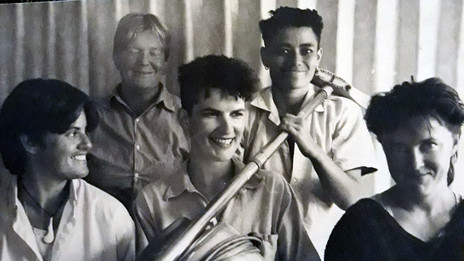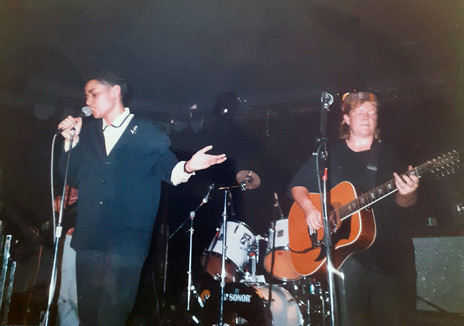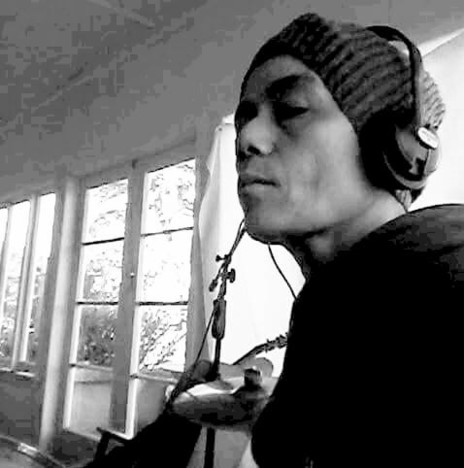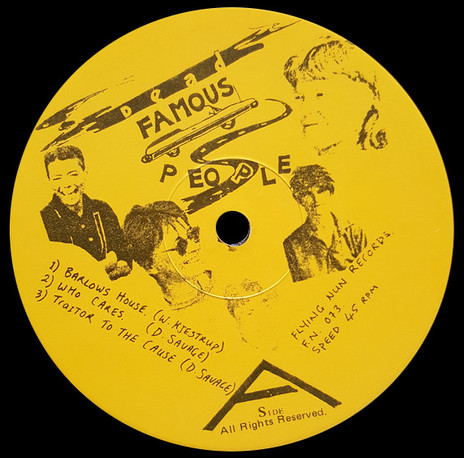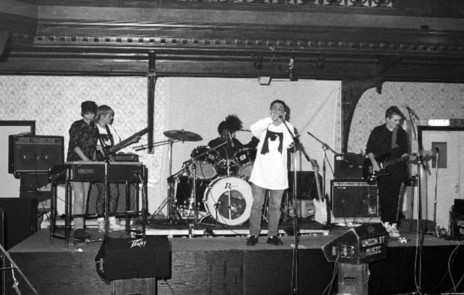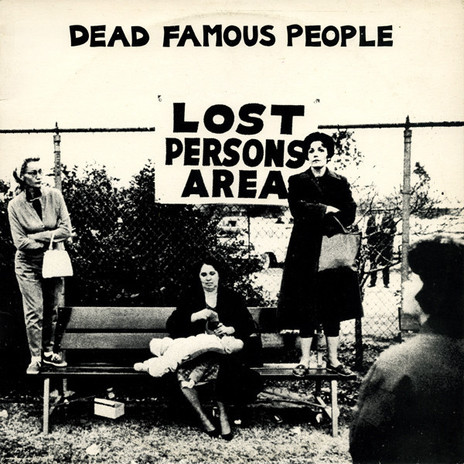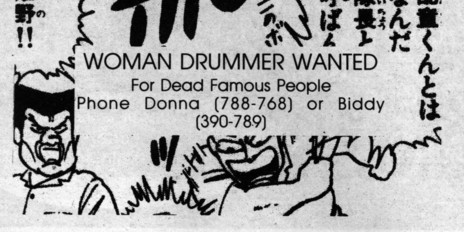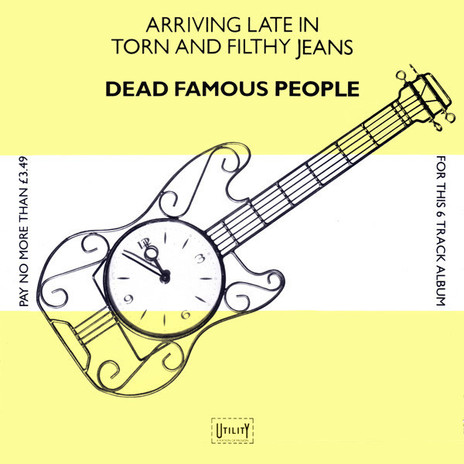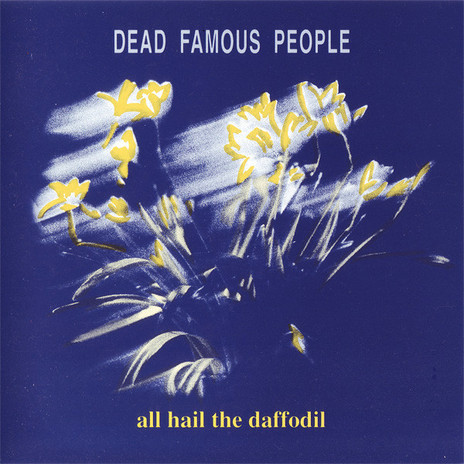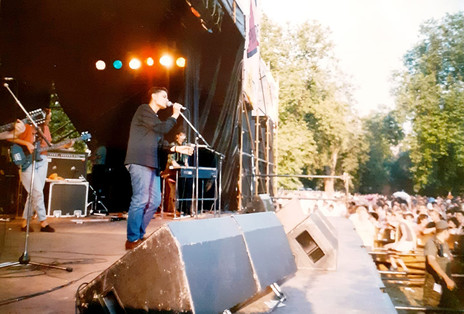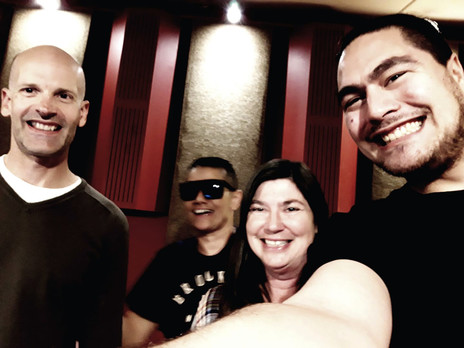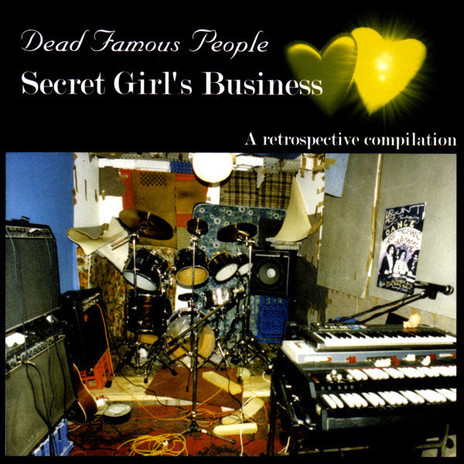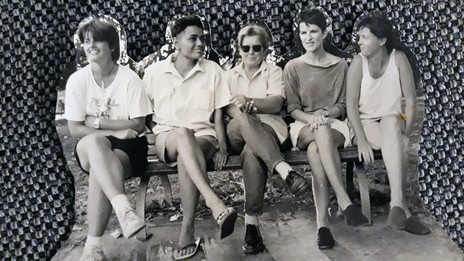Dons Savage has a beautiful voice. Her love of singing started early, harmonising with her parents and six siblings. “My mother sang, she was an amazing singer,” she recalls. “My whole family, we used to sing in harmony from when I was a little toddler.”
Savage taught herself “rudimentary” guitar as a teenager, as well as bass, percussion and drums, before joining an unnamed group with the founding members of Car Crash Set. Savage was fired from the group, she told Graham Reid, “for having no transport to get to rehearsals”.
She joined the all-woman, political-feminist-alt-pop band Freudian Slips a year after seeing them at Sweetwaters. “I thought ‘I want to be in that band, they’re amazing,’” she says, smiling. “The energy, and the stroppy attitude ... they were being heckled by the crowd, and giving it back ... I thought, ‘wow, that’s strong, and I like it.’” After recording an EP with them, On the Line (Jayrem, 1984), she left before the release of their second EP, Are You Laughing? (Jayrem, 1985).
An avid songwriter, Savage left Freudian Slips as “the whole reason I went onto form Dead Famous People, [was] so I could write my own stuff.”
Dead Famous People emerged in 1986, with Savage (vocals), Wendy Kjestrup (guitar and vocals), Jenny Renals (bass), and Robyn Tearle (drums). Savage’s former Freudian Slips band mate Elizabeth (Biddy) Leyland (keyboards and vocals) joined soon after. Savage was very happy to have Leyland on board, noting musical synchronicity. “She’s an amazing keyboard player, [with an] incredible skill with coming up with really unique, perfect parts for my songs.” The band’s name was inspired by what Juliette Fitisemanu called “a cross between a humorous take-off of an English dialect, and more seriously, that some people have only achieved true fame and recognition after they have died.”
After playing a number of shows, their debut EP, Lost Persons Area, was released on Flying Nun in 1987, after Chris Knox heard the band and introduced them to the label, although Savage admits Flying Nun was not on their radar. “I hadn’t really heard of them ... I might have, I can’t really remember. But not an influence, because I’ve always had sort of oddball influence outside of that scene.” She did become partial to some of the label’s music, especially ‘Husband House’ by Sneaky Feelings, as well as The Chills, and Look Blue Go Purple.
Their influences were certainly outside those of the indie/alternative scene at the time, Savage telling BiFiM magazine in 1987, “the list of people we admire is far too vast to be able to say ‘yes, you can tell they listen to the Byrds, or Velvet Underground,’ which is the case with 99 per cent of the bands around. I think that accounts for the interest that has been shown, the completely natural formation of a new style through an input of a thousand separate influences.”
And those influences? They included a diverse range of musicians: Philip Glass, The Slits, Kathleen Ferrier, Wayne Newton and Shirley Bassey. Savage confirms that the musical artists she looked towards weren’t the usual ones, noting the influence of pop, and her mother’s record collection, which included “Nana Mouskouri, John Rowles, Englebert Humperdinck ... Dusty Springfield, and then personally I liked The Osmonds and Bay City Rollers. A bit of everything really, except Flying Nun bands!”
The pop element came through strongly in the ‘Lost Persons Area’ EP (1986).
The pop element came through strongly in Lost Persons Area, five tracks (three by Savage, and two by Kjestrup) which encapsulated their love for sounds that defied the musical zeitgeist. Unlike Freudian Slips, Dead Famous People had a less political feminist approach, although Savage points out “I think I always am ... an ingrained feminist... but I didn’t write particularly in that way.”
Reviews for Lost Persons Area were positive about the contrast between lyrical tone and melody – the BiFiM review noted, “There’s often irony and tension in the contrast between these lyrics and the chirpy melodies and smooth harmonies that underlie them,” and called ‘Barlow’s House’ (by Kjestrup) a pop gem. The same review noted Savage’s song ‘Traitor to the Cause’, as “one of the funniest and best songs around on sexual politics,” and saw underlying humour and regret in the lyrics “When I look at you I feel fill of regret/ I just never thought you’d turn out to be... het!”
The British music bible New Musical Express (NME) also raved about Lost Persons Area, terming it “five bitching poems craftily welded to a folk group setting” while admitting the EP likely “wouldn’t reach the audience it deserves”.
Good reviews aside, the band faced a crossroads later in 1987, when drummer Tearle left the band. They found a replacement in Mo Moss, a Liverpudlian punk drummer living in Auckland. Savage told the NZ Herald in 1987 that Moss hadn’t drummed for a while when she was approached by the band, but “she played really well considering the time she had been away from it”.
However, Moss had to leave New Zealand due to immigration issues, and for a while it was uncertain how the band would continue, but they had no qualms about going to the UK if they couldn’t get Moss back to New Zealand. At the same time, they got a small Arts Council grant, which they initially planned to use towards a video for ‘Barlow’s House’, but this never eventuated. Instead, Dead Famous People decamped to the UK in 1988, finding a new drummer – Gill Moon.
Another reason for the move to the UK was a new record label. The previous year, Billy Bragg had heard them on the radio while in New Zealand, and was interested. “He said ‘who are they? Ask them if they want to come to London and go on my label, Utility,’” Savage recalls, adding, “away we went.” The group signed to Utility, releasing the mini album Arriving Late in Torn and Filthy Jeans (1989), which used three of the tracks from Lost Persons Area (‘Barlow’s House’, ‘Traitor to the Cause’, and ‘Take Your Leather Jacket off’), and three new tracks. It was an opportunity to “give a bit of background with releasing that EP, just [with] some stuff we’d done earlier,” while keyboardist Leyland told the NZ Herald in 1989 that the mini album was “a one off, a bit of a market taster” for the label.
In late-80s New Zealand it seemed like the band “just disappeared”, but in the UK their story was only beginning.
At this point the band’s documented history becomes sparse, as after they left New Zealand few followed their career. Savage acknowledges this, thinking “as far as people here were concerned, we just vanished, which we did,” but in the UK, their story was only beginning. After signing with Utility, and releasing the mini album, the group quickly established themselves on the live performance scene with Gill Moon in the band. “We found a drummer and rehearsal rooms, and started to rehearse and gig, doing a couple of shows a week most weeks for three years. Every week, basically. There were a lot of venues to play,” Savage explains.
The group’s profile was bolstered by a John Peel session in 1989, and Peel called them “an important, exciting contribution to the often pallid world of contemporary pop.” On their Peel session, they played three songs – ‘Postcard from Paradise’, ‘How to be Kind’, and ‘Go Home Stay Home’ – and Savage considers it a career highlight.
Good reviews kept coming – prominent UK writer David Cavanagh considered them “unjustly obscure,” while others compared Savage’s writing to that of songwriters Morrissey and Pete Shelley – Savage sitting easily amongst them.
While in London in 1990, an opportunity arose to work with former Flying Nun labelmates The Chills on their new song, ‘Heavenly Pop Hit’. Martin Phillipps, The Chills’ writer, vocalist and guitarist, wanted a distinctive female harmony voice, and asked Savage if she would sing on the track, which she did, giving the chorus a rich depth with her warm vocals. In 2018, 28 years after the recording, Savage joined The Chills onstage at their show at Galatos, Auckland, to again sing on ‘Heavenly Pop Hit’, and Ambientlight reviewer Sarah Kidd called the performance “all the more special” for her presence onstage.
Peel sessions aside, the band kept gigging through the UK during the 1989-1990 period, and the next recording session came somewhat out of the blue: an offer to record a song for the 1991 Leonard Cohen compilation, I’m Your Fan (EastWest/Atlantic), produced by the French music magazine Les Inrockuptibles. The song ‘True Love Leaves No Traces’ was recorded in strange circumstances, recalls Savage: “We recorded it at this haunted recording studio in the middle of the [night], like 3, or 4am. Seriously haunted, you could actually feel it in the air.”
They discovered the studio – F2 Studios in London – was built on top of a 17th century plague pit. “I’d gone for a long walk down several corridors, it was deserted ... and came back to the engineer ... and I said you could just feel people looking at you, and he said, ‘Well, it’s built on a plague pit.’”
Haunted plague pits aside, their version of the Cohen song, complete with ghostly vocals and keyboard lines, sits well alongside their body of work, a rare cover version in their discography. However, the lack of a secure record deal combined with homesickness led to Dead Famous People disbanding after recording demos of new material.
Savage’s voice did catch the attention of an up-and-coming duo, St Etienne (Bob Stanley and Pete Wiggs), and they teamed up for a while. “We did a small tour of the UK, a University tour, and a couple of London gigs,” she says. They recorded two songs together, both covers: The Field Mice’s ‘Kiss and Make Up’ (Heavenly, 1990), and Gil Scott Heron’s ‘Winter in America’ (Heavenly, 1991). Initially, she thought she might stay with the duo, but life had other plans for her. “My mum wasn’t too well, so I wanted to get back here,” she says, adding ”then again, I thought ‘how about my writing opportunity?’ ... I feel that I have potential to write stuff that I wasn’t getting [released].”
Savage’s voice caught the attention of St Etienne, and they teamed up for a while.
Savage returned to New Zealand around 1991, which she thought was “strange, kind of a relief, and weird after being in London.” She missed London, as that felt more like home, but stayed to care for her mother. Around the same time, in 1991 La De Da records in the UK put out All Hail the Daffodil, an album of tracks by Dead Famous People that had been recorded by the band between late 1988 and mid-1990.
A decade or so later a compilation, Secret Girls Business (Global Routes Music, 2002), was released locally, and included unreleased tracks that had to be remastered from cassettes, as the original master tapes were lost. By this time, Savage had stepped away from the industry. “I’d been sort of worn out by the whole process of knocking on record company doors. The Utility thing not going particularly anywhere, it was quite wearing, and I was disillusioned ... [I] thought let’s take a breath for a while, and it turned out to be a 30-year breather!”
The near three-decade long break Savage had from the music industry was filled with other events, most notably raising a child, and also taking up painting and exhibiting locally in Auckland. While she enjoyed that, it wasn’t music. “I really enjoyed that as well, but it was like a poor subsitute for music! Nevertheless, it was an outlet creatively.”
Savage’s creativity throughout this time included songwriting, and the time came again for Savage to return to her music career. One song led to another, and a new album was created. “I guess once the floodgates opened, they fully opened ... I put it all on the backburner thinking I wanted to focus on parenting first ... Harry, my son, was about 13 by this point – I think I’d put in a good amount in his formative years and been present in his life from the first. Then I thought, maybe it’s my turn now to get back in there.”
An engineer friend had ProTools, which started the process and, at The Lab Recording Studio in late 2018 and early 2019, she recorded Harry (named for her son) under the Dead Famous People moniker. It was technically the first original Dead Famous People album. Savage had a wide range of musical collaborators on the album, including Keria Paterson, Jol Mulholland, Oliver Harmer, Dianne Civil, and Christine White. Former Dead Famous Person Elizabeth Leyland also appears as keyboardist on the song ‘Dog’.
A few labels were interested in releasing Harry, but it was Fire Records in the UK who signed Savage. “Somebody came to me and said ‘Hey, I’ve talked to this guy at Fire Records ... I’ve sent him some of your songs and he liked them, and he wants to hear some more. We got the deal ... it’s a privilege to be there,” she says, with a smile.
Harry again features Savage’s favoured 1960s influences in the album’s melodies, arrangements, and performances, especially on ‘Groovy Girl’, and ‘Looking at Girls’, and her mellifluous voice is front and centre. The album’s mix of lighter songs, and those with more serious themes is important to her, noting that “there are some real throwaway pop tunes that drifted into my head and ended up on there ... I do think you have to pay attention to when those tunes come to your head, and give them an outlet, even if they are just apparently just trivial pop, they’re still a part of your creativity, even though they may be on deeper themes.”
‘Harry’ (2020) features Savage’s 1960s influences in its melodies, arrangements, and performances.
Harry was released to positive reviews – Backseatmafia.com called it a “pop masterpiece” and noted “it is rare that an album can be filled with such perfect pop jewels.” Nick Bollinger, reviewing for The Sampler on Radio NZ, and clearly an admirer, called Harry “the album I always hoped I’d hear from this band”.
There are plans for live performances, but the first Dead Famous People show, scheduled for Auckland festival The Other’s Way in September, was cancelled when Auckland went back into the second Covid-19 lockdown. The performing band features some of the musicians who played on Harry, but, as Savage points out, Dead Famous People is now the name for her “and whoever’s free at the time”.
Savage’s renaissance as a vocalist and songwriter continues, and she is currently in the studio recording the next Dead Famous People album, with further “sketches for maybe four more albums.” The floodgates, as she said, have well and truly opened.
